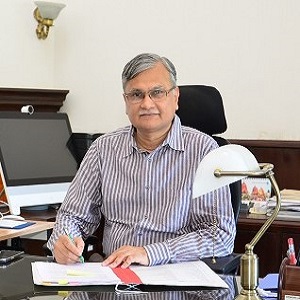Staying True to The Essence and Spirit of Engineering Education
 In an exclusive interview with Higher Education Review, Ajit Kumar Chaturvedi, Director, IIT Roorkee shares his valuable insights on the Indian engineering education landscape, the ROI for engineering programs, importance of soft skills in the engineering domain and more.
In an exclusive interview with Higher Education Review, Ajit Kumar Chaturvedi, Director, IIT Roorkee shares his valuable insights on the Indian engineering education landscape, the ROI for engineering programs, importance of soft skills in the engineering domain and more.
A recent survey shows that only 1.5 percent of engineers in India are fit for new age jobs. What is your opinion on the Indian engineering education landscape?
There is definitely a need for more engineers who are trained and educated in modern and emerging technologies including artificial intelligence, and data science in the industry. At the same time, engineers should also be able to apply newer and innovative methods of science to engineering. The objective of engineering education is not to produce technicians who only know about the things that are taught to them in the curriculum but the real objective is to train the mind to be able to pick up new things, and analyze and think in an engineering context. Because of this, it is not necessary to completely overhaul the engineering curriculum but it is important to be true to the essence of engineering education. If that happens, students will be able naturally pick up new age technologies without any effort because they are trained to learn new things constantly. The important thing is to be true to the essence and spirit of engineering education rather than changing it lock, stock and barrel.
The cost of engineering education in India is increasing constantly with an undergraduate course from a top-notch engineering college costing between 10 and 15 lakhs. At the same time, the popularity for online certification courses is rising as well. In light of this, how do you view the ROI for conventional engineering programs in India?
Conventional engineering programs provide a lot many things that an online certificate course is trying to provide but falls short. For example, conventional engineering education in academic institutions provides an opportunity for being part of collaborative projects, it provides an opportunity to learn in a more collaborative environment, and it provides a great opportunity to learn from your peers as well as learn outside the classroom. These are the things that are very difficult to replicate in an online certificate program. Having said that, there is no need to think about replacing conventional engineering programs with online education. Rather, it is important to make sure that in conventional engineering education, there is enough scope for students to pick up new projects, take up interesting research problems, and be able to do more things hands-on. Through hands-on training, the understanding of concepts and the confidence that students acquire will improve which is also hard to replicate through online programs.
How would you define the importance of interpersonal/soft skills in the engineering domain?
Interpersonal and soft skills are very important. Over the last 10-15 years, we educators have realized its importance more and more. It is not only important to understand science and apply it to solve engineering problems; it is equally important to have the ability to articulate, to express, and to convey our thoughts, whether orally or through writing, through preparing a document, in terms of making a presentation, or in terms of the body language. There is a plethora of ways through which communication can be done, and students as well as professionals need to pick up these skills because only then can they provide leadership. And leadership is essential to be able to pick up big and challenging projects. Owing to this, interpersonal and soft skills have an equally important role in solving modern-day engineering problems.
A 2021 study states that around 38 percent of faculty seats lay vacant in IITs. Why is this happening in some of the premier engineering colleges in India and what are the steps taken by IIT Roorkee to tackle this issue?
It is true that we can take more faculty than we have but IITs are very conscious of the quality of the faculty that they would like to hire. And unless we are sure that this faculty is good enough to serve the institute for the next 30-35 years, we prefer to keep those seats vacant rather than filling it up with whatever is available in the market. It is not like we have a dearth of faculty aspirants or applications, but we follow a rigorous multi-tier process, and not many people are able to qualify at the end of the process.
Going forward, what are some of the major changes that you wish to see in the Indian engineering education domain and how can Indian engineering educators make our graduates compete with their international counterparts?
We have to focus more on team-driven projects. While individual projects are also important because they make students more confident, through team projects, they can define more realistic problems instead of only taking up software or mobile-app driven problems. Owing to this, the best way to improve engineering education is to try and create opportunities for interesting projects that the students can do but at the same time, not lose focus on fundamental science because all engineering is driven by fundamental science. If we lose this focus, then our engineers will not be grounded and they will not be prepared to take up new age technologies

